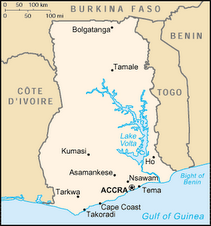Yesterday (Monday), confirmed my fears of the bureaucracy and indifference of working in a Ghana government hospital. An eight year old boy presented with abscesses of the right ear, mastoid and neck after being treated by the ear, nose & throat nurse in the nurse's own private clinic (outside private practice is officially forbidden when one is employed in a government facility). I had previously wondered how this nurse afforded his two cars. When the child was scheduled for surgery with the nurse anesthesists, they wished to do the patient on Thursday, the official ENT operating day. When they were told it was an emergency, they demanded several lab tests. When the lab results were found to be adequate by noon, the senior nurse anesthetist had already left the hospital and had turned off his cell phone. The back-up nurse anesthetist who had also left refused by phone to come back to do the case because his senior had said it was not an emergency. The chief executive officer and the medical director were sought out but they too were not around.
I then operated on the child under local infiltrative anesthesia and 60 cc of exudate drained from several areas. His culture was sent to the lab at 5PM but because the lab was closed, the specimen was placed in the refrigerator. This will kill the bacteria, preventing us from learning the proper medication to use.
Illness is frequently looked upon as a punishment from an offended ancestor or retribution for an act considered taboo such as having sex in the bush, or greeting or eating with the left hand (the left hand is for use in the toilet and for other jobs thought to be unclean).
Relieving oneself is widely done in public, albeit with some discretion. Some men think they will become sterile if they urinate in a toilet which may have been previously used by a menstruating woman. Perhaps that helps to explain why there are no working toilets in the 300 bed hospital. No need to make repairs if people are afraid to use them. While other Ghanaian facilities and many homes do have functioning toilets which are indeed utilized, people of a different mind-set cannot see the logic of urinating or defecating into a hole which is actually inside one's home.
When a family member gets sick, the first person consulted is often a Diviner (usually a male). The Diviner is believed to have special powers which allows him to communicate with the deceased ancestors and to advise what sacrifices are needed to appease them. I recently visited such a Diviner and was impressed with his sincerity. He didn't, however, recommend going to a hospital. The hospital is considered when all else fails and because people are brought there in a moribund condition, it is a place associated with dying.
I have a lot to learn but it is good being here. Although the challenges are many, contributing to a great need is very satisfying.
Tuesday, September 11, 2007
Subscribe to:
Posts (Atom)

